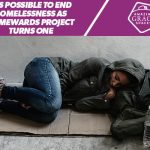How can I help homeless people during a UK heatwave?
When temperatures soar, people sleeping on the streets are at risk of dehydration and sunstroke. Here’s how you can help.
A heatwave in the UK can be great news for sun worshippers – but the sunshine and high temperatures can pose a real threat if you’re experiencing homelessness.
While it’s widely understood that low temperatures in winter put the wellbeing of people experiencing homelessness at risk, it’s also true that particularly warm summers — which we can expect more of as the climate crisis worsens — can be harmful for people sleeping rough.
They’re faced with a battle to find cool spots to shelter in, cold drinking water and places to shower off, while being at higher risk of sunburn, dehydration and heatstroke.
Some southern parts of the UK will meet heatwave criteria this week, according to the Met Office.
Temperatures are expected to reach 32°C in some parts of the south east of England, while a couple of places see 33°C. There is also a chance of ‘tropical nights’ across the south of England, meaning temperatures will remain above 20°C.
Met Office chief meteorologist Neil Armstrong said: “High pressure is situated to the southeast of the UK, which is bringing more settled conditions and temperatures well above average for the time of year. While the highest temperatures are expected in the south, heatwave conditions are likely across much of England and Wales especially, with parts of Scotland and Northern Ireland also likely to see some unseasonably high temperatures.”
Watch out for signs of heatstroke and heat-related illness
The NHS lists the some of the signs of heat exhaustion as:
- a headache
- dizziness and confusion
- loss of appetite and feeling sick
- excessive sweating and pale, clammy skin
- cramps in the arms, legs and stomach
- fast breathing or pulse
- a high temperature of 38C or above
- being very thirsty
If you think someone has heatstroke you need to help them find somewhere to cool down immediately.
These are the steps to take to according to the NHS:
- Move them to a cool place.
- Get them to lie down and raise their feet slightly.
- Get them to drink plenty of water. Sports or rehydration drinks are OK.
- Cool their skin – spray or sponge them with cool water and fan them. Cold packs around the armpits or neck are good too.
Call 999 immediately if they start to breathe quickly or have shortness of breath, have a seizure, lose consciousness, or are not responsive.
Get the latest news and insight into how the Big Issue magazine is made by signing up for the Inside Big Issue newsletter
Ask your local council if they will activate Severe Weather Emergency Protocol (SWEP)
When extreme weather poses a health risk, councils can activate Severe Weather Emergency Protocols.
These can be activated in response to high winds, freezing temperatures and snow as well as extreme heat. It’s up to the council whether they decide to activate Swep. While most local authorities are likely to open up places to shelter and reach out to rough sleepers under Swep, it is at the discretion of each authority.
If you believe your council should be activating Swep, you can contact them to let them know.
Donate some sun cream
A simple way to help a disadvantaged person through the summer months is to give them a bottle of sun cream, whether it’s newly bought or a spare you had at home (as long as you haven’t had it for long – sunscreen can expire).
Give out frozen water bottles
It can sometimes be tricky for people sleeping rough to locate good drinking water, and it becomes even more of a challenge in summer when they need to cool down and stay hydrated. If you plan to give away a bottle of water, stick it in the freezer the night before, so it will stay cold for longer and can also cool sticky foreheads. Even better, find out where your nearest water refill stations are and make sure the person has that information going forward.
If you give a person food, opt for ingredients which contain a lot of water such as juicy fruit or vegetables to help them stay hydrated.
For more information or to discuss alternative methods of giving please contact us anytime.
FULL ARTICLE: t.ly/e_3y1
Further information can be found here https://amazinggracespaces.org/

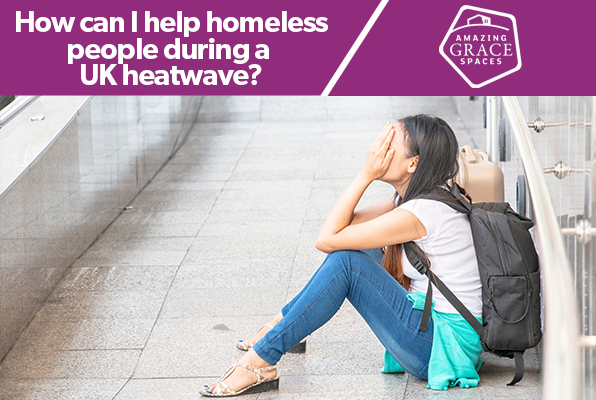
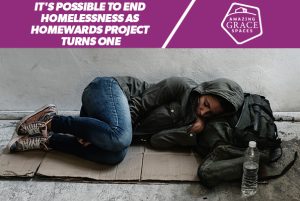
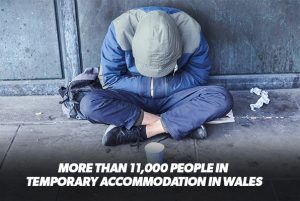
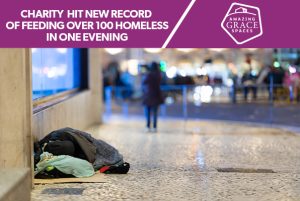
![AGSPurple-Logo1 14042016 v3 [Converted]-01 AGSPurple-Logo1 14042016 v3 [Converted]-01](https://amazinggracespaces.org/wp-content/uploads/elementor/thumbs/AGSPurple-Logo1-14042016-v3-Converted-01-q78ob3gcbc2puzqs3nj8b4maxxo7v9422x4fu3ghxs.png)


